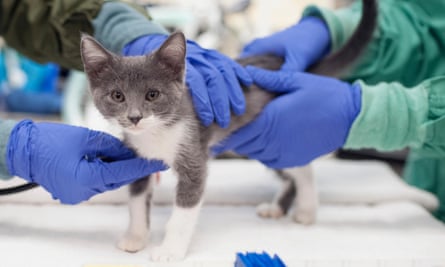Pets don’t have the luxury of free NHS healthcare if they get sick, and even a minor visit to the vet can bring with it a big bill. Pet insurance offers some protection but only one in five owners buy it, according to the market analysis company Statista, and policies do not cover every expense. Routine treatment, including inoculations, won’t be insured, there is usually an excess to pay on claims and you may need to pay upfront for treatment before reclaiming costs.
Even without insurance, there are ways to save on bills without compromising the health of your dog or cat, and these start with the vet you choose.
All veterinary surgeons and nurses practising in the UK must be registered with the Royal College of Veterinary Surgeons (RCVS), but the pricing side of their business is unregulated.
Practices set their own fees and charges, and these will vary between companies and locations. You may face higher rates for evening or weekend appointments and any out-of-hours treatment.
You can find your local practices on the RCVS website and it is worth checking and comparing charges, as well as going on a recommendation.
Consultation fees

The typical cost of an appointment, including consultation and diagnosis (but not medication), is £60, according to the price comparison site Moneysupermarket.com.
You can save at some practices by booking an appointment with the consulting nurse. For example, at Coastway Vets, which has seven branches across Sussex, a consultation with a nurse costs under £20 for a dog or cat compared with £45 to see a vet.
The Animal Trust, a not-for-profit veterinary company, has a free consultation policy, so all you pay for is any treatment.
The service is open to anyone. However, on a practical basis, you will need to live near one of the trust’s 10 surgeries, based across Yorkshire, Cheshire, Greater Manchester and north Wales.
The Animal Trust’s founder, Dr Owen Monie, says: “We offer free consultations to avoid the barrier of a pet owner gaining professional advice through anxiety over a consultation fee.” If no treatment is needed, there is no charge.
The trust publishes costs on its website – something many practices do not do, although these should always be available on request.
Monie adds: “Many clients find our fees significantly cheaper than conventional surgeries and we avoid ‘loss leaders’ like neutering as we don’t think it’s fair to lure in new clients with cheap shop-around services, and then charge more elsewhere when the pet is sick and it can be difficult to shop around.”
Free or discounted treatment

If money is tight, do not assume your local vet will have a sympathetic ear. “There’s no obligation on practices to offer payment plans,” the RCVS says. While it says many do, this is at their discretion.
If you are claiming certain benefits, including universal credit, you can get free or discounted treatment from animal charities including Blue Cross and PDSA. Demand for these services has increased dramatically since the coronavirus pandemic started, with PDSA saying calls from those eligible for its services rose by 81% last year.
Check your eligibility online before making an appointment. You will also need to live near one of the charities’ hospitals.
Along with emergencies, routine treatment – including vaccinations, worming and microchipping – can also be carried out, although services are currently restricted because of Covid-19.
The RSPCA can also offer limited help, although it is predominantly for animals that have been rescued and require urgent treatment.
Get advice from a video vet
If you have minor concerns, a phone or video call service can offer a cheaper option than making an appointment with your vet.
Companies in this market include the app-based video service FirstVet and the phone-based PetGPIn both cases, medication cannot be prescribed. “We provide an advice and triage service for owners,” says Dr Jessica May, the UK lead vet at FirstVet.
The company claims about 65% of calls are resolved without any need for a referral.
All of the vets at FirstVet are on the RCVS register and the service is available 24 hours a day, seven days a week. Charges are £24 on weekdays (9am – 6pm) and £36 at other times.
PetGP also says two out of three cases do not need a trip to the vet. There is a flat £20 fee per call, or unlimited calls for £6.99 a month.
Save on prescriptions
If a trip to the vet means medication, most of us probably buy it over the counter at the practice – but there is no obligation to buy it there.
Clearly, with urgent treatment, it makes sense to do so, but for ongoing and long-term medication you can save money by buying online. Some vets may make a charge to supply written prescriptions.
Animed Direct is one of the UK’s largest online pet pharmacies and, according to its commercial manager, Karen Wilkins-Hall, “sources veterinary products from the same supplier your vet uses”.
Buying direct, according to Wilkins-Hall, can mean a typical saving of 55% “but for some products it can be as high as 70% and we also supply prescription diets your vet may have recommended, and our savings on those are as much as 70%”.
The biggest savings come if your pet needs long-term medication, say for a thyroid condition, or a specially formulated diet for diabetes or heart disease, as it can be costly to keep buying; especially if the pet isn’t insured or may only be insured for a year’s worth of treatment.
When buying online, look for the Veterinary Medicines Directorate accredited retailer badge, and double-check the store is registered to dispense veterinary prescription medicines.
You can check the list of accredited online retailers online.
To buy, you will need to supply proof of the prescription.
